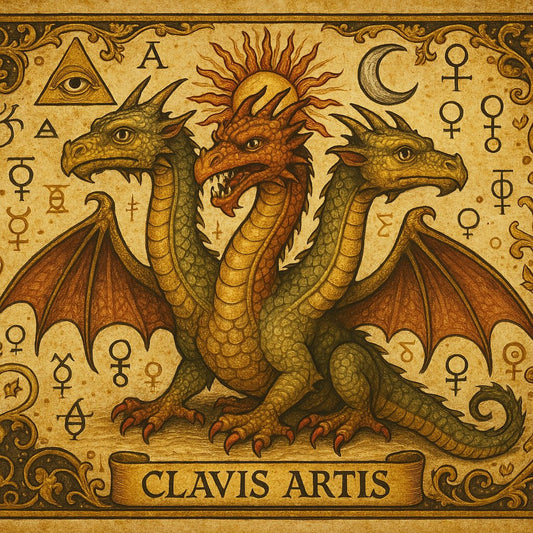-
7 sisters of the pleiades Sweatshirt | Premium Soft Sweater
Research contribution Research contribution: $52.00Previous contributionUnit contribution / per -
Ace of Cups Research Support | Tarot Consciousness Studies
Research contribution Research contribution: $23.00Previous contributionUnit contribution / per -
Alchemical Discovery Research Support | Sage & Seer Studies
Research contribution Research contribution: $23.00Previous contributionUnit contribution / per -
Alchemical Dragon Tshirt
Research contribution Research contribution: $23.00Previous contributionUnit contribution / per -
Alchemical Process Research Support | Sacred Transformation Studies
Research contribution Research contribution: $23.00Previous contributionUnit contribution / per -
Amethyst Tumbled Stone - Spiritual Insight & Inner Peace Crystal
Research contribution Research contribution: $41.00Previous contributionUnit contribution / per -
Aquarius Consciousness Research Support | Innovation & Collective Evolution
Research contribution Research contribution: $52.00Previous contributionUnit contribution / per$67.00Support level (on contribution) Support level: $52.00Sale -
Archai Research Support | Time Spirits & Spiritual Hierarchy Studies
Research contribution Research contribution: $26.00Previous contributionUnit contribution / per
Collection: Thalira
Blog posts
View all-

The Three-Headed Dragon in Consciousness Transf...
The Three-Headed Dragon in Consciousness Transformation Research Medieval alchemists discovered that specific symbolic imagery triggers measurable consciousness transformation. The three-headed dragon from Clavis Artis manuscripts reveals how ancient wisdom traditions...
The Three-Headed Dragon in Consciousness Transf...
The Three-Headed Dragon in Consciousness Transformation Research Medieval alchemists discovered that specific symbolic imagery triggers measurable consciousness transformation. The three-headed dragon from Clavis Artis manuscripts reveals how ancient wisdom traditions...
-

Shadow Integration Through Dragons | Jung Psych...
Shadow Integration Through Dragon Symbolism Carl Jung's most profound psychological insight involves integrating the shadow - those rejected aspects of self that hide in unconscious darkness. Dragon symbolism provides powerful...
Shadow Integration Through Dragons | Jung Psych...
Shadow Integration Through Dragon Symbolism Carl Jung's most profound psychological insight involves integrating the shadow - those rejected aspects of self that hide in unconscious darkness. Dragon symbolism provides powerful...
-

Practical Dragon Energy Meditation Techniques
Practical Dragon Energy Meditation Techniques Dragon energy meditation combines ancient visualization practices with modern understanding of consciousness development to create powerful techniques for psychological transformation. These methods integrate breathing exercises,...
Practical Dragon Energy Meditation Techniques
Practical Dragon Energy Meditation Techniques Dragon energy meditation combines ancient visualization practices with modern understanding of consciousness development to create powerful techniques for psychological transformation. These methods integrate breathing exercises,...
-

Modern Neuroscience and Archetypal Symbol Proce...
Modern Neuroscience and Archetypal Symbol Processing Contemporary neuroscience validates Jung's insights about archetypal symbols through brain imaging studies that reveal specific neural networks activated during symbolic processing. When participants engage...
Modern Neuroscience and Archetypal Symbol Proce...
Modern Neuroscience and Archetypal Symbol Processing Contemporary neuroscience validates Jung's insights about archetypal symbols through brain imaging studies that reveal specific neural networks activated during symbolic processing. When participants engage...
FAQ's on Confucianism

What is Confucianism?
Confucian Philosophy | Understanding Confucian Philosophy
Confucian philosophy represents one of China's most influential systems of moral, philosophical, and social thought. Developed from the teachings of Confucius (551-479 BCE), this tradition has shaped East Asian civilization for over two millennia.
Core Confucian Values | Essential Confucian Principles
The fundamental values include:
• Ren (Benevolence)
• Yi (Righteousness)
• Li (Propriety)
• Xiao (Filial Piety)
• Zhong (Loyalty)
• Zhi (Wisdom)
Confucian Relationships | Five Key Relationships
The social order is maintained through:
• Ruler and Subject
• Father and Son
• Husband and Wife
• Elder and Younger
• Friend and Friend
Confucian Cultivation | Path of Self-Cultivation
Confucianism emphasizes personal and social development through moral education, ritual propriety, and ethical conduct. Rather than focusing on religious doctrine, it provides practical guidance for creating social harmony and personal virtue. This philosophical system continues to influence modern society through its emphasis on education, family values, and social responsibility.
Who was Confucius?
Chinese Sage Confucius | Life of Chinese Sage Confucius
Confucius (551-479 BCE), known in Chinese as Kong Fuzi or Master Kong, stands as one of history's most influential philosophers and teachers. His profound wisdom and ethical teachings shaped Chinese civilization and continue to influence global thought.
Confucius's Life Journey | Historical Background of Confucius
Born into a modest family in the state of Lu, Confucius developed a comprehensive system of thought focusing on:
• Moral Character
• Ethical Leadership
• Social Harmony
• Educational Philosophy
• Political Reform
Confucian Legacy | Impact of Confucian Teaching
His enduring influence manifests through:
• The Analects (Lunyu)
• State Examination System
• Educational Traditions
• Government Philosophy
• Cultural Values
Confucius revolutionized Chinese thought by emphasizing personal virtue, proper social relationships, and moral governance. His teachings, recorded in the Analects by his disciples, established a philosophical tradition that would influence East Asian civilization for over two millennia, promoting the ideal of the noble person (junzi) who cultivates wisdom and moral excellence.
What are the core values of Confucianism?
Core Confucian Values | Understanding Core Confucian Values
Core Confucian values form the foundation of Confucian ethical philosophy, providing guidelines for personal conduct and social harmony. These timeless principles continue to influence East Asian society and global ethical thought.
Essential Confucian Virtues | Five Primary Confucian Virtues
The fundamental virtues include:
• Ren (仁) - Benevolence
• Li (礼) - Propriety
• Xiao (孝) - Filial Piety
• Yi (义) - Righteousness
• Zhi (智) - Wisdom
Purpose of Confucian Values | Application of Confucian Ethics
These core values serve multiple functions:
• Personal Development
• Social Harmony
• Family Unity
• Moral Leadership
• Cultural Continuity
The Confucian value system emphasizes the cultivation of moral character through practice of these virtues. These principles work together to create a harmonious society founded on ethical behavior, proper relationships, and continuous self-improvement.
What is the role of education in Confucianism?
Confucian Educational Philosophy | Traditional Chinese Education
Education stands as a cornerstone of Confucian philosophy, where learning and self-cultivation are paths to developing wisdom and virtue. Through education, individuals nurture both moral character and intellectual growth.
Classical Confucian Learning Methods | Ancient Chinese Educational System
The Confucian approach to learning emphasizes:
Core Virtues in Confucian Teaching:
- Ren (仁) - Benevolence
- Yi (義) - Righteousness
- Li (禮) - Proper conduct
- Zhi (智) - Wisdom
- Xin (信) - Trustworthiness
Through these traditional educational principles, Confucianism creates a framework where personal development serves both individual growth and societal harmony. Education thus becomes the bridge between self-cultivation and social contribution.
How does Confucianism view leadership and rulers?
Confucian Leadership Philosophy | Traditional Chinese Governance
In Confucian thought, leadership embodies moral authority and exemplary conduct. A ruler's primary duty is to govern through virtuous example, demonstrating wisdom and ethical behavior that inspires their subjects to follow similar principles.
Confucian Ruler Qualities | Imperial Leadership Virtues
The ideal Confucian leader must possess:
Essential Leadership Traits:
- Ren (仁) - Benevolence and compassion
- Yi (義) - Righteousness and justice
- Li (禮) - Proper ritual and conduct
- Xiao (孝) - Filial piety
- De (德) - Moral character
Through these fundamental virtues, Confucian rulers create social harmony and prosperity, governing not through force but through moral excellence and wisdom. This philosophical approach to leadership emphasizes the ruler's role as both a political authority and moral exemplar.
How does Confucianism differ from other Chinese philosophies like Taoism and Legalism?
Chinese Philosophical Schools | Ancient Chinese Philosophy
While Confucianism emphasizes social harmony and moral conduct, each major Chinese philosophical tradition offers distinct approaches to life and governance. These ancient philosophical systems shaped Chinese thought in unique ways.
Major Chinese Philosophy Differences | Classical Chinese Thought
Key Philosophical Schools:
- Confucianism (儒家) - Social harmony, ethics, relationships
- Taoism (道家) - Natural harmony, simplicity, spontaneity
- Legalism (法家) - Strict laws, order, pragmatic rule
The philosophical contrasts between these schools lie in their core approaches: Confucianism builds society through moral development, Taoism seeks alignment with natural universal laws, and Legalism enforces order through strict governmental control. Each philosophy offers distinct solutions to achieving social order and personal cultivation.
Does Confucianism promote spirituality or religion?
Confucian Spiritual Philosophy | Chinese Philosophical Tradition
Confucianism functions primarily as a philosophical and ethical system, emphasizing moral conduct over religious doctrine. While incorporating ceremonial elements, its core focus remains on practical wisdom and social harmony.
Confucian Ritual Practices | Traditional Chinese Ceremonies
Key Spiritual Elements:
- Li (禮) - Ritual propriety
- Xiao (孝) - Ancestral reverence
- Tian (天) - Heaven concept
- De (德) - Moral cultivation
- Jing (敬) - Respectful practice
Rather than promoting supernatural beliefs, Confucianism emphasizes the development of moral character and proper social relationships. Its ceremonies and rituals serve to reinforce social bonds and ethical principles rather than express religious devotion, distinguishing it from traditional religious systems.
What is the Confucian view on the afterlife?
Confucian Afterlife Beliefs | Traditional Chinese Views
Confucianism places minimal emphasis on afterlife concepts, focusing instead on virtuous living in the present moment. The philosophy addresses mortality through the lens of ancestral reverence and family continuity.
Ancestral Veneration Practices | Chinese Ancestor Worship
Key Afterlife Elements:
- Jing (敬) - Reverent remembrance
- Xiao (孝) - Filial devotion
- Li (禮) - Memorial rituals
- Ji (祭) - Ancestral offerings
- Zu (族) - Family lineage
Rather than speculating about the nature of existence after death, Confucian tradition emphasizes maintaining connections with ancestors through ritual practices and moral conduct. This focus on ancestral respect serves to strengthen family bonds and preserve cultural continuity across generations.




















